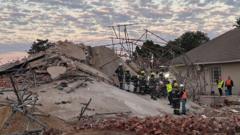David Lochridge, the Oceangate whistleblower, details his efforts to alert the company about safety issues that ultimately culminated in the catastrophic implosion of the Titan submersible in June 2023. Lochridge, ex-Director of Marine Operations, voiced his concerns after being terminated in 2018, and now believes that better oversight could have prevented the tragedy.
**Oceangate Whistleblower Speaks Out: Calls Disaster a "Tragedy That Could Have Been Prevented"**

**Oceangate Whistleblower Speaks Out: Calls Disaster a "Tragedy That Could Have Been Prevented"**
Former Oceangate employee David Lochridge reveals safety concerns that led to the Titan submersible disaster, where five lives were lost during a dive to the Titanic wreck.
Lochridge had worked with Oceangate anticipating a pioneering submersible project aimed at exploring the Titanic wreck. However, his growing concerns over the vessel's safety, stemming from its design and construction processes, led him to fear for the safety of future dives. Following the devastating incident that killed five crew members, including the company's CEO, the US Coast Guard released findings that corroborated Lochridge's warnings about Oceangate's negligence in safety protocols.
His account reveals a series of overlooked red flags, including issues with the construction of the carbon fiber hull and inadequate safety certifications. Despite his persistent efforts to raise alarms, Lochridge faced resistance and ultimately dismissal. He pursued a complaint through the Occupational Safety and Health Administration (OSHA), which was later transferred to the US Coast Guard, a decision he believes contributed to the tragedy.
In the aftermath of the Titan's implosion, the USCG's report highlighted missed opportunities for intervention. Lochridge criticizes OSHA for its slow response, suggesting that timely action could have potentially saved lives. This tragic event reflects broader concerns about regulatory oversight in high-stakes industries, calling for improvements to ensure worker safety and accountability.
Oceangate has since ceased operations and is collaborating with investigators. Meanwhile, Lochridge continues to emphasize the importance of safety and ethical responsibility in the exploration of deep seas.
**Oceangate Whistleblower Speaks Out: Calls Disaster a "Tragedy That Could Have Been Prevented"**
Former Oceangate employee David Lochridge reveals safety concerns that led to the Titan submersible disaster, where five lives were lost during a dive to the Titanic wreck.
David Lochridge, the Oceangate whistleblower, details his efforts to alert the company about safety issues that ultimately culminated in the catastrophic implosion of the Titan submersible in June 2023. Lochridge, ex-Director of Marine Operations, voiced his concerns after being terminated in 2018, and now believes that better oversight could have prevented the tragedy.
Lochridge had worked with Oceangate anticipating a pioneering submersible project aimed at exploring the Titanic wreck. However, his growing concerns over the vessel's safety, stemming from its design and construction processes, led him to fear for the safety of future dives. Following the devastating incident that killed five crew members, including the company's CEO, the US Coast Guard released findings that corroborated Lochridge's warnings about Oceangate's negligence in safety protocols.
His account reveals a series of overlooked red flags, including issues with the construction of the carbon fiber hull and inadequate safety certifications. Despite his persistent efforts to raise alarms, Lochridge faced resistance and ultimately dismissal. He pursued a complaint through the Occupational Safety and Health Administration (OSHA), which was later transferred to the US Coast Guard, a decision he believes contributed to the tragedy.
In the aftermath of the Titan's implosion, the USCG's report highlighted missed opportunities for intervention. Lochridge criticizes OSHA for its slow response, suggesting that timely action could have potentially saved lives. This tragic event reflects broader concerns about regulatory oversight in high-stakes industries, calling for improvements to ensure worker safety and accountability.
Oceangate has since ceased operations and is collaborating with investigators. Meanwhile, Lochridge continues to emphasize the importance of safety and ethical responsibility in the exploration of deep seas.
His account reveals a series of overlooked red flags, including issues with the construction of the carbon fiber hull and inadequate safety certifications. Despite his persistent efforts to raise alarms, Lochridge faced resistance and ultimately dismissal. He pursued a complaint through the Occupational Safety and Health Administration (OSHA), which was later transferred to the US Coast Guard, a decision he believes contributed to the tragedy.
In the aftermath of the Titan's implosion, the USCG's report highlighted missed opportunities for intervention. Lochridge criticizes OSHA for its slow response, suggesting that timely action could have potentially saved lives. This tragic event reflects broader concerns about regulatory oversight in high-stakes industries, calling for improvements to ensure worker safety and accountability.
Oceangate has since ceased operations and is collaborating with investigators. Meanwhile, Lochridge continues to emphasize the importance of safety and ethical responsibility in the exploration of deep seas.
**Oceangate Whistleblower Speaks Out: Calls Disaster a "Tragedy That Could Have Been Prevented"**
Former Oceangate employee David Lochridge reveals safety concerns that led to the Titan submersible disaster, where five lives were lost during a dive to the Titanic wreck.
David Lochridge, the Oceangate whistleblower, details his efforts to alert the company about safety issues that ultimately culminated in the catastrophic implosion of the Titan submersible in June 2023. Lochridge, ex-Director of Marine Operations, voiced his concerns after being terminated in 2018, and now believes that better oversight could have prevented the tragedy.
Lochridge had worked with Oceangate anticipating a pioneering submersible project aimed at exploring the Titanic wreck. However, his growing concerns over the vessel's safety, stemming from its design and construction processes, led him to fear for the safety of future dives. Following the devastating incident that killed five crew members, including the company's CEO, the US Coast Guard released findings that corroborated Lochridge's warnings about Oceangate's negligence in safety protocols.
His account reveals a series of overlooked red flags, including issues with the construction of the carbon fiber hull and inadequate safety certifications. Despite his persistent efforts to raise alarms, Lochridge faced resistance and ultimately dismissal. He pursued a complaint through the Occupational Safety and Health Administration (OSHA), which was later transferred to the US Coast Guard, a decision he believes contributed to the tragedy.
In the aftermath of the Titan's implosion, the USCG's report highlighted missed opportunities for intervention. Lochridge criticizes OSHA for its slow response, suggesting that timely action could have potentially saved lives. This tragic event reflects broader concerns about regulatory oversight in high-stakes industries, calling for improvements to ensure worker safety and accountability.
Oceangate has since ceased operations and is collaborating with investigators. Meanwhile, Lochridge continues to emphasize the importance of safety and ethical responsibility in the exploration of deep seas.




















